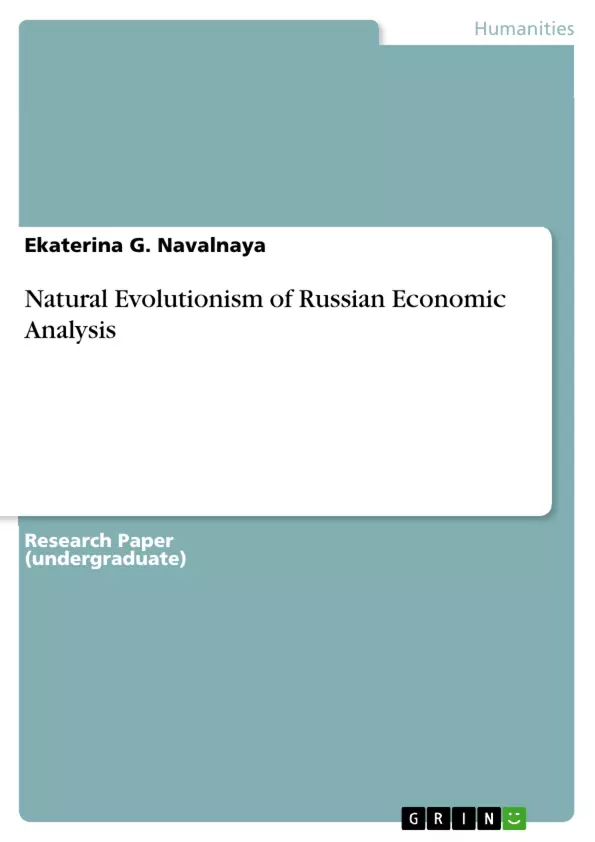The article introduces an analysis of economic research method in Russian thought. The analysis made on the basis of a concise historical overview seeks to identify particular features of economic research method in Russia, trace their origin, put them into a wider context of economic theory progress, to assume a possible direction of further development of Russian “indigenous” approaches to economic research. The following conclusions have been drawn. Economic methodology in Russia does have particular traits grounded in its Weltanschauung and a singular path of historical development. This methodology had been developing over decades, in pre-revolutionary Russia and then in USSR till Russia’s transition to market economy, when ideas of mainstream economic theory started to be thoroughly scrutinized and assimilated. It is apparent to some observers, though, that this assimilation in many respects remains the official rhetoric, while the “indigenous” approaches remain to exist and be used somehow implicitly. At the same time these approaches show some similarity with “Western alternative” to economic orthodoxy, the evolutionary economic theory, which has been developing for the last 30 years. Thus, in regard to perspective of Russian economic analysis development it is suggested a comparative study of the evolutionary economic theory methodology and the Russian approaches to economic analysis with its characteristic viewpoint and conceptual apparatus undertaken as part of a more general reassessment of core concepts and methods of mainstream theory.
Inhaltsverzeichnis (Table of Contents)
- Introduction
- Russian Economic Analysis: Historical Overview
- Mutuality in Russian and Western Approaches to Economic Analysis
- Coevolution Direction of Russian and Western Approaches
Zielsetzung und Themenschwerpunkte (Objectives and Key Themes)
This article aims to identify the distinctive features of economic research methods in Russia, trace their origins, and place them within the broader context of economic theory development. It argues that these characteristics exist not only explicitly but also implicitly, often overlooked or debated.
- The influence of Weltanschauung on economic theory development in Russia
- The historical evolution of economic analysis in Russia, including pre-revolutionary, Soviet, and post-Soviet periods
- The relationship between Russian economic analysis and Western economic theory
- The potential for coevolution between Russian and Western approaches to economic analysis
- The role of "indigenous" approaches in Russian economic research
Zusammenfassung der Kapitel (Chapter Summaries)
- Introduction: This chapter provides a brief overview of the research process and the objectives of the study, highlighting the importance of understanding the historical and philosophical context of Russian economic analysis.
- Russian Economic Analysis: Historical Overview: This chapter examines the evolution of economic analysis in Russia, focusing on the development of distinctive features within the context of its unique historical trajectory.
- Mutuality in Russian and Western Approaches to Economic Analysis: This chapter explores the convergence and divergence of Russian and Western approaches to economic analysis, highlighting potential areas of mutual influence and collaboration.
- Coevolution Direction of Russian and Western Approaches: This chapter suggests a path for the coevolution of Russian and Western economic analysis, emphasizing the potential for mutual learning and enrichment through a comparative study of methodologies.
Schlüsselwörter (Keywords)
The primary keywords and focus topics of this work include Russian economic analysis, evolutionary economic theory, economic development, Weltanschauung, "indigenous" approaches, historical context, and comparative methodology.
Frequently Asked Questions
What are the distinctive features of Russian economic analysis?
Russian economic analysis is deeply grounded in its unique historical development and Weltanschauung, often emphasizing evolutionary and indigenous approaches over Western orthodoxy.
How did Soviet economic thought influence current Russian methods?
The methodology developed over decades in the USSR remains implicitly present even after the transition to a market economy, often existing alongside official mainstream rhetoric.
What is the link between Russian economic analysis and evolutionary theory?
Russian indigenous approaches show significant similarities with Western "alternative" evolutionary economic theories that focus on long-term development and systemic changes.
What is meant by "indigenous" approaches in this context?
They refer to economic research methods and conceptual apparatuses that originated within Russia and reflect its specific socio-historical trajectory.
Why is a comparative study of Russian and Western theories suggested?
To reassess core concepts of mainstream theory and find common ground for the coevolution of different economic research methodologies.
- Arbeit zitieren
- MA Ekaterina G. Navalnaya (Autor:in), 2014, Natural Evolutionism of Russian Economic Analysis, München, GRIN Verlag, https://www.grin.com/document/276155



